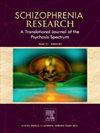精神病的阴性症状:定性研究的范围综述
IF 3.6
2区 医学
Q1 PSYCHIATRY
引用次数: 0
摘要
精神分裂症的阴性症状,其特征是正常过程的缺失或减少,研究不足,有效的治疗方法仍然难以捉摸。定性研究可以为这些复杂现象提供新颖和以患者为中心的见解。此范围综述综合了先前发表的定性研究的结果,旨在探索先前的结果并确定已发表文献中的空白。方法于2023年4 - 6月对MEDLINE、CINAHL和PsycINFO数据库进行系统检索。关于精神疾病阴性症状的定性研究符合纳入条件。筛选和数据提取程序由两名独立工作的审稿人完成。根据与研究团队的共识会议,使用叙事综合对提取的发现进行总结。结果综合检索得到4753篇文章,其中6篇研究被认为符合纳入条件。纳入的研究共同深入研究了阴性症状的经历、原因和后果。参与者报告了一系列受社会动态、社会耻辱和童年创伤影响的负面症状经历。不同症状域之间存在明显的相互作用,包括消极症状(如动机和社交能力)受到积极症状(如幻觉和妄想)的影响。研究还强调了处方药物和药物使用对阴性症状的影响。确定了需要进一步定性研究的领域,包括探索原发性和继发性阴性症状之间的区别,以及深入了解阴性症状随时间的演变。结论本综述对精神分裂症阴性症状的主观体验和多因素促成因素提供了有价值的见解。研究结果,如阴性和阳性症状之间的相互作用,强调了对这些复杂症状的整体理解的重要性,这可以通过定性探索来了解。此外,定性观点可以加强未来的研究途径,并有可能帮助开发更有效的治疗阴性症状的方法。本文章由计算机程序翻译,如有差异,请以英文原文为准。
Negative symptoms in psychosis: A scoping review of qualitative studies
Introduction
Negative symptoms in schizophrenia, characterised by the absence or reduction of normal processes, are understudied and effective treatments remain elusive. Qualitative research can provide novel and patient-centred insights into these complex phenomena. This scoping review synthesizes findings from previously published qualitative studies aiming to explore previous results and identify gaps in the published literature.
Methods
A systematic search was conducted on MEDLINE, CINAHL, and PsycINFO databases between April and June 2023. Qualitative studies on negative symptoms in psychotic illnesses were eligible for inclusion. Screening and data extraction procedures were performed by two reviewers working independently. Extracted findings were summarised using narrative synthesis based on consensus meetings with the research team.
Results
A comprehensive search yielded 4753 articles, with six studies deemed eligible for inclusion. The included studies collectively delved into the experiences, causes, and consequences of negative symptoms. Participants reported a spectrum of negative symptom experiences influenced by social dynamics, societal stigma, and childhood trauma. There was a noticeable interaction between different symptom domains, including negative symptoms, such as motivation and sociability, being influenced by positive symptoms, such as hallucinations and delusions. Studies have also highlighted the impact of prescribed medication and substance use on negative symptoms. Areas needing further qualitative research were identified, including exploring the differentiation between primary and secondary negative symptoms, and gaining a deeper understanding of negative symptom evolution over time.
Conclusions
This scoping review provides valuable insights into the subjective experience of negative symptoms and the multifactorial contributory factors to negative symptoms in schizophrenia. The findings, such as the interplay between negative and positive symptoms, emphasise the importance of a holistic understanding of these complex symptoms, which can be informed by qualitative exploration. Furthermore, the qualitative perspectives can enhance future research avenues, and have potential for assisting the development of more effective approaches for treating negative symptoms.
求助全文
通过发布文献求助,成功后即可免费获取论文全文。
去求助
来源期刊

Schizophrenia Research
医学-精神病学
CiteScore
7.50
自引率
8.90%
发文量
429
审稿时长
10.2 weeks
期刊介绍:
As official journal of the Schizophrenia International Research Society (SIRS) Schizophrenia Research is THE journal of choice for international researchers and clinicians to share their work with the global schizophrenia research community. More than 6000 institutes have online or print (or both) access to this journal - the largest specialist journal in the field, with the largest readership!
Schizophrenia Research''s time to first decision is as fast as 6 weeks and its publishing speed is as fast as 4 weeks until online publication (corrected proof/Article in Press) after acceptance and 14 weeks from acceptance until publication in a printed issue.
The journal publishes novel papers that really contribute to understanding the biology and treatment of schizophrenic disorders; Schizophrenia Research brings together biological, clinical and psychological research in order to stimulate the synthesis of findings from all disciplines involved in improving patient outcomes in schizophrenia.
 求助内容:
求助内容: 应助结果提醒方式:
应助结果提醒方式:


